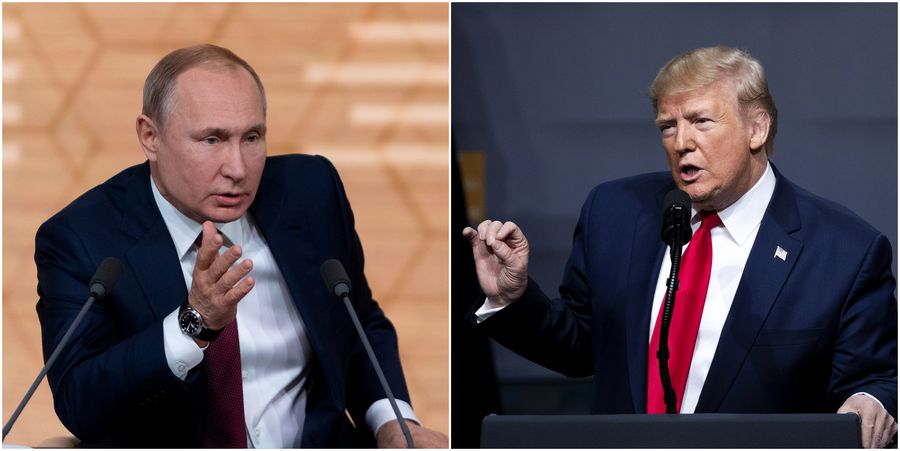
Xinhua file photos of Russian President Vladimir Putin and U.S. President Donald Trump
Some chronic rifts grew even deeper this year, and there are no signs for quick reconciliation.
by Xinhua writer Shi Hao
MOSCOW, Dec. 30 (Xinhua) -- The outgoing 2019 was another year of confrontation between Russia and the United States in various regions and spheres, particularly in arms control, the Middle East, gas supplies to Europe, and Latin America.
Some chronic rifts grew even deeper this year, and there are no signs for quick reconciliation as the 2020 election is likely to heat up negative sentiment in the United States against Russia.
ARMS CONTROL
One prominent issue that testifies to their worsening ties in 2019 was the withdrawals of the United States and Russia from the Intermediate-Range Nuclear Forces (INF) Treaty, one of the cornerstones for the arms control regime between the two military powers.
After the collapse of the INF Treaty, the New Strategic Arms Reduction Treaty (New START) remains the last legal instrument that mutually limits the nuclear missile potential of the two countries and provides predictability in the field of arms control.
The bilateral New START is due to expire in February 2021, but Washington has yet to respond to Moscow's proposal to extend it, Russian President Vladimir Putin said earlier this month at his annual press conference.
Russia is ready to work on new arms control agreements but in the meantime will continue to strengthen its nuclear forces to ensure adequate deterrence, Putin later told a meeting of senior defense officials.
MIDDLE EAST
In 2019, Russia delivered two batches of its most advanced S-400 air defense missile systems to Turkey, a member country of the North Atlantic Treaty Organization, in defiance of strong U.S. opposition.
Russia offered to sell Turkey Su-35 fighters if Ankara wants them, after the United States kicked Turkey out of the F-35 jet program due to the S-400 purchase.
Following an October agreement, Russia and Turkey started joint patrols in northern Syria, where Russia has permanently deployed helicopters to provide air coverage for the missions. Moscow also accused U.S. troops in Syria of looting oil facilities and deposits.
As for the Iran nuclear issue, the Russian Foreign Ministry said in November the U.S. policy of confrontation with Iran was destructive and short-sighted, and a possible collapse of the Iran nuclear deal would be the result of the unilateral illegitimate exit of the United States from the agreement.
GAS PIPELINE
Earlier this month, the U.S. Congress approved the National Defense Authorization Act for Fiscal Year 2020, which includes sanctions on the Nord Stream-2 pipeline that is designed to deliver 55 billion cubic meters of Russian natural gas per year to European countries under the Baltic Sea.
Kremlin spokesman Dmitry Peskov said the U.S. sanctions would not stop the construction of the Nord Stream-2 pipeline and the sanctions violated international law and were an example of unfair competition.
U.S. President Donald Trump has criticized the project, which, according to him, will increase Europe's dependence on Russia. Moscow has retorted that Trump's criticism was aimed at promoting sales of more expensive U.S. liquefied natural gas to Europe.
Putin told senior executives of German businesses in December that the Nord Stream-2 would make an additional contribution to meeting the energy demand of European countries and strengthen the energy security of the continent.
LATIN AMERICA
Russia this year kept close ties with Venezuelan and Cuban governments, which are thorns in the U.S. side.
Putin met with Venezuelan President Nicolas Maduro in the Kremlin in September and reiterated support for him and the dialogue between Maduro's government and the opposition.
Putin said that Russia would honor its obligations in carrying out the maintenance of Russian-made military equipment in Venezuela, supplying spare parts and creating service centers. Russia could invest around 1 billion U.S. dollars in mining projects in Venezuela.
As for Cuba, the other major target of U.S. sanctions in Latin America, Russian Prime Minister Dmitry Medvedev visited the island country in October and Moscow hosted visiting Cuban President Miguel Diaz-Canel later in the month.
On Oct. 3 in Havana, Medvedev criticized the tightening of U.S. blockade against the island, which has been there for more than half a century and created a toxic atmosphere around cooperation with the island and scared economic investors.
At talks with visiting Diaz-Canel in late October, Putin said the two countries supported one another on the international arena and Moscow well understood Havana's independent stand and sovereign policy.
"I admit concerns over the United States' attempts to reshape the (Latin American) continent to suit its geopolitical interests," Russian Foreign Minister Sergei Lavrov said in a recent interview with TASS news agency. ■



